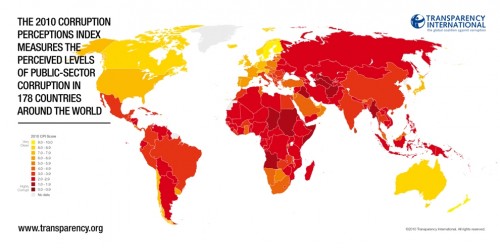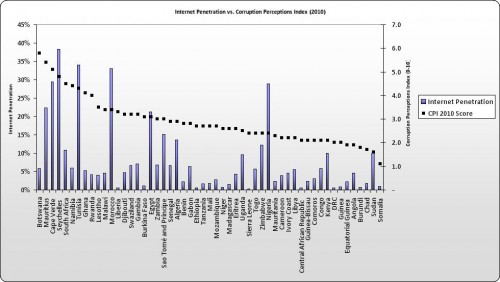Corruption Perceptions Index vs. Internet Penetration
Allowing corruption to continue is unacceptable; too many poor and vulnerable people continue to suffer its consequences around the world. We need to see more enforcement of existing rules and laws. There should be nowhere to hide for the corrupt or their money.” – Huguette Labelle, Chair of Transparency International
Last week, Transparency International (“the global coalition against corruption”), released its annual report outlining the perceived levels of corruption in 178 countries. African results rely upon anywhere from 3 to 8 surveys initiated by organizations like the African Development Bank, World Bank, and World Economic Forum.
In the vein of the Internet, we may speculate that corrupt governments are less likely foster high levels of Internet penetration. Offhand, untrustworthy regimes seem to oppose privatization of the telecommunication industry and open collaboration among all levels for a national ICT policy – two actions that support Internet penetration. In general, the common lack of transparency that comes with corrupt leadership mars economic growth. Additionally, foreign investors ostensibly do not want to work with questionable governments. So, are any trends apparent after plotting recent Internet penetration data on the same chart as the Corruption Perceptions Index? Loosely, yes, although there are numerous exceptions:
- 4 of the 9 least corrupt African countries rank among the top 9 in terms of Internet penetration
- Of the 9 nations (top 19%) with the highest Internet penetration, 8 rank in the top 22 (top 42%)
- Botswana, determined to be the least perceived-corrupt African nation, lies in the middle in terms of Internet penetration
- Nigeria, although ranking 4th in terms of Internet penetration, ranks near the bottom third for African CPI
- Kenya and Sudan lag much of Africa in terms of perceived corruption despite showing substantially better-than-average Internet penetration
By the way, only Gambia showed a noticeable (-0.3 pt) year-over-year decrease in perceived corruption among African nations.
Data from Internet World Stats and Transparency International:
Country Internet Penetration CPI 2010 Score
Botswana 5.9% 5.8
Mauritius 22.4% 5.4
Cape Verde 29.5% 5.1
Seychelles 38.4% 4.8
South Africa 10.8% 4.5
Namibia 6.0% 4.4
Tunisia 34.0% 4.3
Ghana 5.3% 4.1
Rwanda 4.1% 4.0
Lesotho 4.0% 3.5
Malawi 4.6% 3.4
Morocco 33.0% 3.4
Liberia 0.5% 3.3
Djibouti 4.8% 3.2
Swaziland 6.6% 3.2
Gambia 7.1% 3.2
Burkina Faso 1.1% 3.1
Egypt 21.2% 3.1
Zambia 6.8% 3.0
Sao Tomé and Princípe 15.2% 3.0
Senegal 6.6% 2.9
Algeria 13.6% 2.9
Benin 2.2% 2.8
Gabon 6.4% 2.8
Ethiopia 0.5% 2.7
Tanzania 1.6% 2.7
Mali 1.8% 2.7
Mozambique 2.8% 2.7
Niger 0.7% 2.6
Madagascar 1.5% 2.6
Eritrea 4.3% 2.6
Uganda 9.6% 2.5
Sierra Leone 0.3% 2.4
Togo 5.7% 2.4
Zimbabwe 12.2% 2.4
Nigeria 28.9% 2.4
Mauritania 2.3% 2.3
Cameroon 3.9% 2.2
Ivory Coast 4.6% 2.2
Libya 5.5% 2.2
Central African Republic 0.5% 2.1
Guinea-Bissau 2.4% 2.1
Comoros 3.1% 2.1
Congo 5.9% 2.1
Kenya 10.0% 2.1
DRC 0.5% 2.0
Guinea 0.9% 2.0
Equatorial Guinea 2.2% 1.9
Angola 4.6% 1.9
Burundi 0.7% 1.8
Chad 1.8% 1.7
Sudan 10.0% 1.6
Somalia 1.0% 1.1














 Twitter
Twitter Facebook
Facebook Pinterest
Pinterest